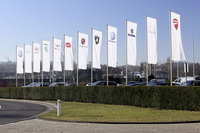Volkswagen Group: Solid Performance In The First Nine Months; Outlook For Fiscal Year 2013 Confirmed
WOLFSBURG – Oct 30, 2013: The Volkswagen Group reported a solid performance in the first nine months of fiscal year 2013, despite the ongoing difficult market environment. Including China, Group deliveries increased by 4.8 per cent to 7.2 million vehicles worldwide. The Group’s share of the passenger car market rose year-on-year to 12.7 per cent (12.6 per cent). Sales revenue grew to €145.7 billion (€144.2 billion) in the first nine months despite negative effects due to the market situation in Europe and exchange rates. Operating profit amounted to €8.6 billion (€8.9 billion). Earnings were impacted by contingency reserves in the Passenger Cars and Power Engineering business areas. Consolidated operating profit does not include the €3.5 billion (€2.8 billion) share of the operating profit of the Chinese joint ventures. These companies are included using the equity method and are therefore reflected in the financial result. Profit before tax in the first nine months was €9.4 billion (€23.0 billion), whereby measurement effects in connection with the integration of Porsche (€12.3 billion) had significantly lifted the prior-year figure. Profit after tax was €6.7 billion (€20.2 billion).
The Board of Management reiterated its forecast for fiscal year 2013. “It remains unchanged: The goals we have set ourselves for the current fiscal year are very ambitious given the extremely difficult economic environment. But, as before, we are standing by these goals. I am convinced that 2013 will be a solid year for the Volkswagen Group thanks to our outstanding model range and broad global presence,” said Prof. Dr. Martin Winterkorn, Chairman of the Board of Management of Volkswagen Aktiengesellschaft, in Wolfsburg on Wednesday.
CFO Hans Dieter Pötsch is confident about the Volkswagen Group’s chosen strategy in light of the developments expected in the automotive markets: “We are focusing on disciplined cost and investment management, as well as on further improving all of our processes. Together with our outstanding products, we believe that this is the right path towards becoming even more competitive. This is particularly important given the fact that the economic environment is not expected to improve in the short term.”
High net liquidity in the Automotive Division
At €16.6
billion, net liquidity in the Automotive Division at the end of September
was €6.1 billion higher than at year-end 2012. This was due in part
to the robust business model, which is capable of generating solid cash
flow even in a challenging environment. In addition, the capital base was
strengthened by the successful placement of a mandatory convertible note
and hybrid note. Investments in property, plant and equipment in the
Automotive Division rose to €6.4 billion (€6.0 billion). The
Volkswagen Group again maintained its investment discipline with a ratio of
investments in property, plant and equipment (capex) to sales revenue in
the Automotive Division of 5.0 per cent (4.6 per cent). Investments related
primarily to production facilities and the models to be launched in 2013
and 2014, as well as the ecological focus of the model range.
Brands and Business Fields
Worldwide unit sales by the
Volkswagen Group rose by 3.8 per cent year-on-year in the first nine months
to 7.2 million vehicles (7.0 million).
The Volkswagen Passenger Cars brand sold 3.5 million cars in the first three quarters, down 3.8 per cent on the prior-year period (3.6 million). The brand’s operating profit of €2.1 billion (€2.9 billion) was weighed down by lower sales volumes and upfront expenditures for new technologies.
Audi brand unit sales were on a level with the previous year at 1.0 million vehicles (1.0 million); the Chinese joint venture FAW-Volkswagen sold a further 309,000 Audi vehicles (247,000). Audi reported an operating profit of €3.7 billion (€4.2 billion) on the back of negative mix effects, higher upfront investments in new products and technologies, as well as the expansion of its global production facilities.
ŠKODA’s sales declined by 4.9 per cent to 524,000 vehicles (551,000). Its operating profit amounted to €371 million (€567 million), dampened by lower sales volumes, deteriorations in the mix, currency effects and the launch of new products.
Despite the continued weakness in the overall Spanish market, SEAT sold 335,000 vehicles (315,000) worldwide, 6.4 per cent more than in the previous year. The operating loss was on a level with the previous year at €93 million (€95 million).
Bentley delivered 6,600 vehicles (6,700). At €98 million, its operating profit was up on the prior-year figure of €73 million.
Sports car manufacturer Porsche sold 115,000 vehicles and generated an operating profit of €1.9 billion in the first nine months of 2013.
Volkswagen Commercial Vehicles delivered 325,000 vehicles (330,000). Its operating profit rose to €342 million (€300 million).
Scania lifted its sales to 56,000 trucks and buses (47,000). Operating profit remained on a level with the previous year at €691 million (€688 million) as a result of increased pressure on margins.
MAN sold 98,000 trucks and buses (101,000) and reported an operating profit of €47 million (€518 million). Lower volumes, declining revenue from the licence business and in particular the recognition of project-specific contingency reserves in the Power Engineering business area were negative factors.
Volkswagen Financial Services generated an operating profit of €1.1 billion (€1.0 billion).



